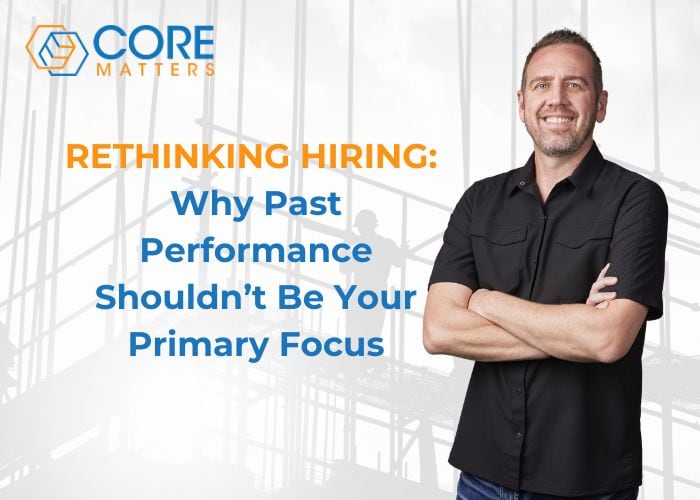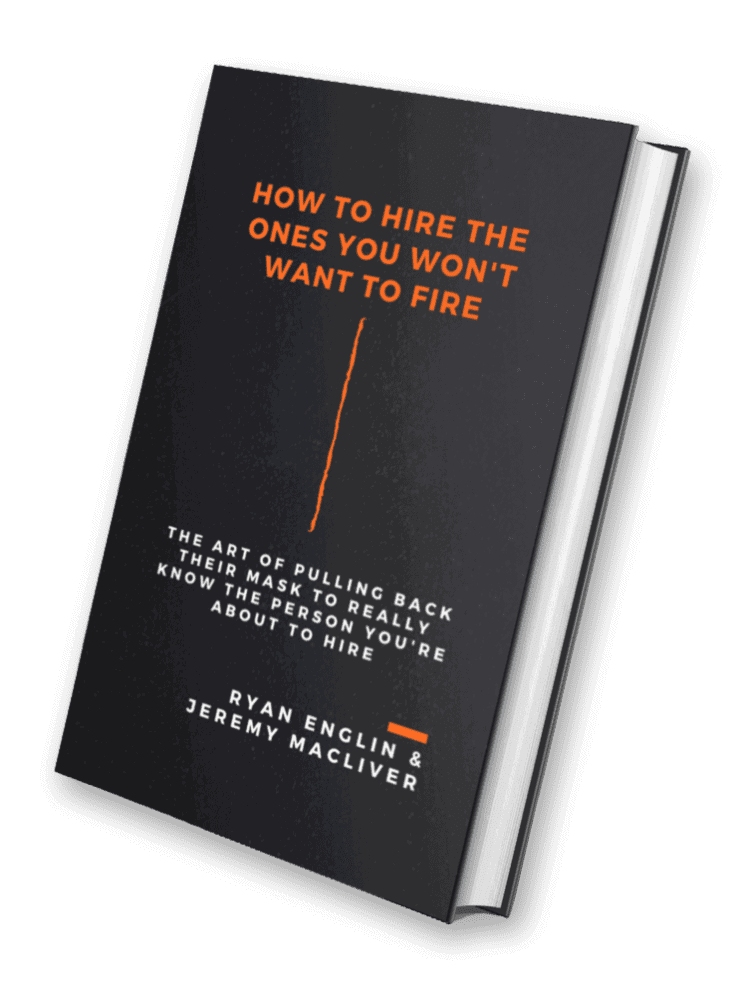Rethinking Hiring: Why Past Performance Shouldn’t Be Your Primary Focus

After sitting through dozens of interviews, it’s no wonder the candidates start to blur together. Everyone seems to have the same lackluster resume and the same experiences. So, how will you know if someone has what it takes to be a successful member of your team?
In the dynamic world of blue collar businesses, where success hinges on the strengths of your team, it’s easy to turn to past performance as an indicator of future success. However, by taking a revolutionary approach to hiring and looking beyond the resume, you can explore an often ignored candidate pool.
Welcome to a new era of hiring, where the emphasis is on building a workforce that transforms your industry.
The Toxicity of Past Experiences
Consider the candidate who, despite being highly skilled, was overlooked for promotions with their previous employer because they didn’t fit into a toxic culture. This type of candidate wants to work hard and do a great job, but doesn’t want to get involved in workplace drama or jobsite politics. While they had the technical skills and drive to succeed, their circumstances affected their past performance and their growth. It would be easy to mistakenly overlook this resume, when in reality, the only issue was their previous employer’s culture.
Now imagine a candidate who was thrown into a job without any training. When they asked their supervisor questions, they were met with screaming and public shaming. Is it surprising they didn’t include their former employer as a reference? Again, it would be easy to ignore this resume because they don’t have a recent reference; however, the actual issue is a previous toxic workplace, not the job seeker.
“In the right environment, with the right support, almost anyone can thrive.” – Ryan Englin, Founder & CEO of Core Matters
It’s your job as a leader to determine what it takes for a candidate to succeed on your team and find someone who will match that.
Finding the Right Environment
Instead of focusing on past performance, concentrate on determining the right environment for a candidate to thrive. During the interview, emphasize culture fit. You can do this by asking questions that assess whether or not they would fit in on your team, if they would succeed in the role, and how they would deliver for your customers.
While these may not be the typical types of questions you ask, they’ll help you uncover whether or not the candidate would be a good hire.
Excellent Past Performance
You might feel like you hit the jackpot when you get a candidate that seems like a culture fit and has a track record of excellent past performance. But consider this…
Not everyone comes from a company that tracks metrics. Alternatively, some companies put low goals in place, mistakenly thinking this boosts morale and encourages harder work. You could even be interviewing the best talent out of a team of poor performers.
The point is, without digging into their experience deeper, you’ll never really know where your candidate is coming from, so it’s best to use other factors to determine who to hire.
Teaching Soft Skills
While performance and skills with measurable metrics are important to get the job done, they’re not the only thing that keeps your company running. Research shows that 85% of career success comes from having well-developed soft skills.
Soft skills include:
- Adaptability
- Communication
- Critical Thinking
- Empathy
- Leadership
- Listening
- Problem Solving
- Time Management
For many blue collar jobs, technical skills can be taught fairly quickly. What sets candidates apart is their ability to think objectively, troubleshoot, and interact with the team appropriately.
Consider putting candidates in the field, providing simple tasks to keep them busy, and gradually teaching the essential soft skills needed to thrive in your company. By focusing on teaching the soft skills first, you’ll build a foundation for an employee who understands what you do and why you do it that way.
Look at Behaviors
Instead of focusing on past performance, look at current behaviors. During the interview, watch how the candidate responds to different questions. Are they able to think quickly on their feet? Do they ask for clarification when a question doesn’t make sense? Are they constantly interrupting and trying to get the last word in?
If there aren’t any red flags during the interview, you’re only halfway there. Once they’re hired, see how they handle challenges and failures. Are they easily frustrated or motivated to work harder? Are they always rushing to finish a project at the last minute or do they have the skills to plan and use their time effectively?
Train your leadership to encourage team members who are willing to stretch beyond their comfort zone and adapt to changing circumstances. By recognizing and rewarding the behaviors and soft skills your company culture requires, you’ll be able to build a team that thrives.
Setting Realistic Expectations
In roles where performance is crucial – such as sales, customer service, or production – engage candidates in conversations about their beliefs and mindset.
If an employee has control over their performance, dig into their perception of what is possible. If someone thinks they can make three sales a day, they’re right. If they think they can make five sales, they’re right. If you think they can close ten sales and they think they can do five – they’re right. Performance often comes down to the person’s mindset and what they believe is possible.
Alternatively, if your top seller has only ever closed 12 sales in a day, and a candidate comes in promising to close 50, they might not understand the job or they may be out of touch with reality. Ask specific questions to figure out why their answer is so far outside of your expectations.
It’s critical to have conversations about mindset, beliefs, and expectations during the interview so you know who you’re really hiring.
Example: The Farmer vs. Hunter Assessment
The farmer and the hunter analogy is often used in business. “Farmers” are known for building relationships with existing customers to strengthen their long term relationships and encourage continued business. “Hunters,” on the other hand, are always on the lookout for their next opportunity.
It’s important to consider which type of personality would be best in the role you’re hiring for. Once you know, be on the lookout for the type of candidate you’re interviewing. While “farmers” may appear more reserved and cautious in their answers, their quiet confidence and care sets them apart in a role that requires close relationships and trust. Oppositely, “hunters” may seem bold and aggressive, but they’re usually open to new processes and willing to take risks to push the boundaries and reach new heights.
Be warned, you can’t trust your initial impression of a candidate. Most people spend time preparing for interviews and rehearsing answers to common questions. You have to be creative to uncover a candidate’s authentic self.
Find the Right Role For Everyone
Consider a sales role where a candidate expresses enthusiasm and positivity during the interview. You ask what motivates them and they respond by saying, “closing deals.” Afterall, they want to land this sales job. You initially peg them as a “hunter” and place them in a role to make cold calls. After a few hours, you realize that they’re spending 30 minutes on each call and not closing any deals.
A deeper conversation reveals that their actions align with a farmer’s mindset – steady and cautious, rather than a hunter’s aggressive pursuit of new opportunities. They explain that what really motivates them is getting to know the customer and finding the precise solution that will serve them best. Upon further review, it becomes clear that they’d be better fit in a client relationship role. This example emphasizes the need to go beyond surface-level impressions and assess behaviors and drive. Both personality types are important to your business, but putting everyone in the right position is critical.
Shift Your Approach
As a blue collar business leader, re-evaluating your approach to hiring is a strategic move. By shifting the focus from past performance to cultural fit, soft skills, and behavioral assessments, you open the door to finding candidates who are not only skilled but also aligned with your company’s values and goals.
Remember, past performance might be a chapter in a candidate’s story, but it shouldn’t be the sole predictor of their future success in your organization.
If you want to find out how you can start attracting the right people to your job openings, schedule your complimentary discovery call today.



